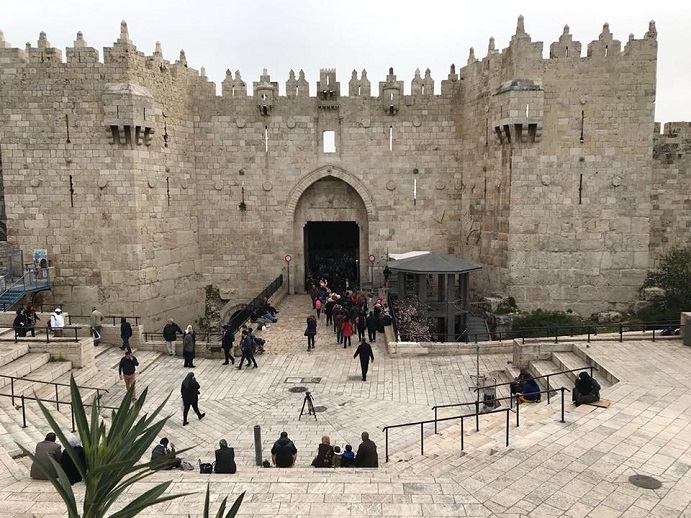Jonathan Ofir
Mondoweiss / December 6, 2021
In 2016 when Elor Azarya shot an incapacitated Palestinian in the head there was actually debate over the act among Israeli politicians. There was no such disagreement this weekend following Israel’s latest extrajudicial execution.
This Saturday, a Palestinian man stabbed an Israeli Jew close to the Damascus Gate in Jerusalem, inflicting moderate wounds. The man, identified as 23-year-old Mohammed Shawkat Salameh from the West Bank town of Salfit, then ran towards Border Police officers who shot him several times – notably twice when he was already laying on the ground, incapacitated, from a distance of about 5 meters. Haaretz covered the act and the responses widely.
The video of that shooting was captured on film and circulated on social media.
Only few politicians in Israel criticized it.
Ahmad Tibi from the Palestinian-representing Joint List:
“Neutralization“ is a whitewashing. This is execution in cold blood, confirmation of killing of a wounded person who is laying on the ground and endangering nobody. Additionally, he was denied initial medical treatment despite there being a medical team on site until he died. This is a criminal act which demands investigation.
Ofer Cassif, also of the Joint List called the shooting a “summary execution”, and another fellow Joint List member, Aida Touma-Sliman stated: “Executing a man who no longer constitutes a threat is a horrible crime. This is the reality created by the occupation.” Also Esawi Freige from the left Meretz party, said that shooting should only serve “to save lives, and not to take the lives of assailants who no longer pose danger.” He called it “an act that shows indifference to human lives.”
So far, so good – there seems to be some human decency in Israeli politics, calling a spade a spade. But that’s only a tiny fringe of the political spectrum. Move a bit rightwards to Labor, and it’s already support for murder. Public Security Minister Omer Bar-Lev:
“When there’s a doubt, there’s no doubt.”
He said the officers had “a second or two” after the first shot to “determine whether the terrorist who was hit is going to set off an explosive belt.”
But did they determine that there was an explosive belt? The assailant was wearing a pretty slim sweater, and there was absolutely no talk of such a thing. Explosive belts have never been used in stabbing attacks, for that would be counterproductive to the goal. Anyway, it’s been over five years since the last suicide bombing (it was on a Jerusalem bus), and none of this follows such a pattern. By Bar-Lev’s logic, if there’s a mere doubt as to whether any Palestinian has an explosive belt under his sweater, it’s undoubtedly better to shoot them and confirm the kill, than to take a chance – and there’s always doubt about Palestinians.
Over five years ago, in the case of Elor Azarya, the soldier-medic who shot an incapacitated Palestinian in the head at point blank, Azarya also claimed at a point that he feared an explosive belt. But the court rejected this argument, since no one around seemed alarmed and Azarya’s proclaimed argument for the shooting at the point was “he had to die”.
The assailant this Saturday was shot not because he was suspected to have an explosive device. He was shot and let to bleed because the Border Police officers thought he had to die.
And thus, politicians all over the mainstream political spectrum hailed the act of murder.
Foreign Minister, centrist Yair Lapid also said he “fully backs our fighters. We will not let terrorists run wild in Jerusalem or in any other part of the country.” Defense Minister Benny Gantz said the officers did the “obvious” thing, stressing they have his backing. Prime Minister Naftali Bennett said he “fully backs” the officers who shot the Palestinian assailant, saying they “operated as expected of Israeli officers.”
It’s interesting, that in the case of Azarya, there was actually considerable debate over the act, which was essentially the same act. Then, Chief of Staff Gadi Eisenkot said that Azarya had “erred”. Even hawkish Likud Defenese Minister Moshe Ya’alon condemned the act:
We don’t just shoot at people, not even if he’s a terrorist, not even at another soldier who just shot at you but has now surrended and has been neutralized, we don’t just shoot… It was clear to the top brass that this is not something you do.
But now it’s something you do. There’s no doubt.
How did this shift of mainstream political opinion occur? This may be part of the “Azarya effect”. Many in Israel were dismayed by the sense of limitation that the Azarya case represented. Azarya noted how such execution was done “tons of times”, but that now he was being used as a scapegoat.
And we’ve seen indications that it was, indeed, done tons of times after the Azarya case. The police extrajudicial execution of Bedouin citizen Yaqub Abu al-Qia’an in Umm al Hiran in 2017 (it was later realized he was not a terrorist and was not attempting the suspected car-ramming at all) and the police-execution of Ahmed Erekat in 2020. These cases are clear-cut executions including the same denial of medical treatment, and the Forensic Architecture analyses of both cases contradicts very clearly the claim that these were deliberate rammings at all. In the case of Al-Qia’an, the Israeli schoolteacher, many seemed to be subsequently convinced of his innocence.
Nonetheless, in the case of the occupied Palestinian Erekat, no such benefit of doubt is afforded, and even the Israeli High Court ruled that Erekat’s body – his body! – would not be released to his family.
Israel has decided to build an iron wall of denial concerning its murderous extrajudicial execution policy.
That is, once again, a reason for why the ICC is needed. It’s a lawless, war-crime hailing country.
Jonathan Ofir is an Israeli musician, conductor and blogger/writer based in Denmark













